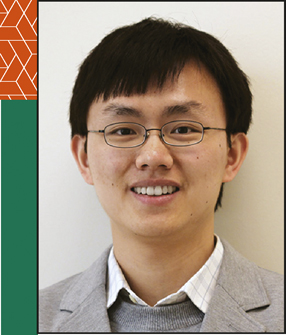Sheng Xu, University of California, San Diego (UC San Diego), has received the Outstanding Young Investigator Award “for materials and device designs in biointegrated electronics and stretchable energy systems.” This award recognizes outstanding interdisciplinary scientific work in materials research by a young scientist or engineer. The recipient must also show exceptional promise as a developing leader in the materials area.

Xu received his BS degree in chemistry and molecular engineering from Peking University in Beijing, China, and his PhD degree in materials science and engineering from the Georgia Institute of Technology, where he was responsible for a large fraction of the programs on growth of ZnO and PbZrTiO3 nanowires and their application in piezoelectric energy harvesters. In particular, he developed low-temperature solution-phase chemistries for epitaxially grown oxide nanowire arrays and schemes for integrating them into capacitor-type structures designed for converting mechanical into electrical energy. These accomplishments brought him to the Department of Materials Science and Engineering at the University of Illinois at Urbana-Champaign, where he worked as a postdoctoral research associate.
Xu’s presentation on “Soft Electronics for Noninvasive Health Care—From the Skin to Below the Skin” will discuss soft electronic devices that can acquire vital signs from the human body. Combined strategies of materials design and advanced microfabrication allow the integration of a variety of components and devices on a stretchable platform, resulting in functional systems with minimal constraints on the human body. In his presentation, Xu will demonstrate a wearable multichannel patch that can sense a collection of signals from the human skin in a wireless mode. Additionally, integrating high-performance ultrasonic transducers on the stretchable platform adds a third dimension to the detection range of conventional soft electronics. Ultrasound waves can penetrate the skin and noninvasively capture dynamic events in deep tissues, such as blood pressure and blood flow waveforms in central arteries and veins.
Xu is currently an assistant professor in the Department of Nanoengineering at UC San Diego. His research group focuses on crystalline material growth for high-performance energy-harvesting devices and biointegrated electronics for health monitoring and human–machine interfaces. His research has been highlighted as “Groundbreaking Research in 2018” by Forbes and “12 innovations that will revolutionize the future of medicine” by National Geographic. He has received the MIT Technology Review 35 Innovators Under 35 Award, the NHLBI Technology Development Award, 3M Non-Tenured Faculty Award, International Union of Pure and Applied Chemistry Prize for Young Chemists, and the MRS Graduate Student Award.


